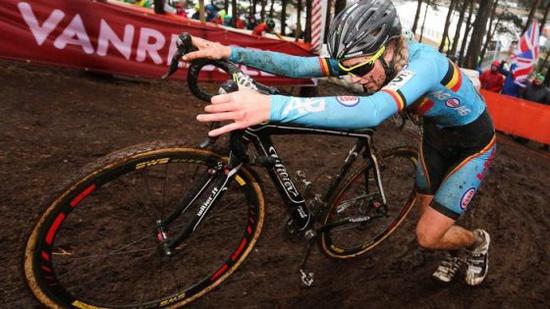- News
- Reviews
- Bikes
- Accessories
- Accessories - misc
- Computer mounts
- Bags
- Bar ends
- Bike bags & cases
- Bottle cages
- Bottles
- Cameras
- Car racks
- Child seats
- Computers
- Glasses
- GPS units
- Helmets
- Lights - front
- Lights - rear
- Lights - sets
- Locks
- Mirrors
- Mudguards
- Racks
- Pumps & CO2 inflators
- Puncture kits
- Reflectives
- Smart watches
- Stands and racks
- Trailers
- Clothing
- Components
- Bar tape & grips
- Bottom brackets
- Brake & gear cables
- Brake & STI levers
- Brake pads & spares
- Brakes
- Cassettes & freewheels
- Chains
- Chainsets & chainrings
- Derailleurs - front
- Derailleurs - rear
- Forks
- Gear levers & shifters
- Groupsets
- Handlebars & extensions
- Headsets
- Hubs
- Inner tubes
- Pedals
- Quick releases & skewers
- Saddles
- Seatposts
- Stems
- Wheels
- Tyres
- Health, fitness and nutrition
- Tools and workshop
- Miscellaneous
- Tubeless valves
- Buyers Guides
- Features
- Forum
- Recommends
- Podcast
 femke wilier.jpg
femke wilier.jpgMechanical doping: Belgian federation to buy scanner ahead of Classics
Belgium’s national cycling federation, the KBWB, says it cannot wait for the UCI to roll out technology to combat mechanical doping, so plans to take matters into its own hands by investing up to €50,000 in scanning equipment ahead of the cobbled Classics season beginning next weekend.
The news follows the discovery, last month, of a hidden motor in a bike prepared for under-23 rider Femke Van den Driessche at the UCI Cyclo-cross World Championships in Zolder, Belgium.
The Belgian rider insists that the bike belongs to a friend and was washed and prepared for racing in error by her mechanics, but as a strict liability offence following a change in UCI regulations last year, she faces a minimum ban of six months.
> "It was a friend's bike ..." - here's 5 more of cycling's top excuses
It was the first event at which the UCI trialled an app it commissioned to enable officials equipped with tablet computers to detect so-called “technological fraud,” and the governing body said it would continue to test the technology throughout 2016 at women’s races.
> Video: Can a hidden motor help an amateur beat a top champion? -
But with the Omloop Het Nieuwsblad taking place this Saturday and Kuurne-Brussels-Kuurne on Sunday, the KBWB is keen to get its own hand-held scanner so it can perform checks at that and other races during the current season, reports Het Nieuwsblad.
The Belgian federation’s president, Tom Van Damme, said: "The UCI is working on an app to carry out this kind of check, but it won’t be ready until the 2017 season.
“We don’t want to wait, so we want to buy our own scanner and carry out our own tests next weekend.
“The device needs to be sufficiently practical, because we need to test a lot of bicycles in a short time.
“There are several reputable firms and our technical committee will make a quick decision, but the cost is high – between €40,000 and €50,000.”
He added that another option was to engage an external firm to carry out the tests.
> All our coverage of the Femke Van den Driessche mechanical doping scandal
It was in Belgium at the Tour of Flanders in 2010 that suspicions riders might be benefiting from assistance from concealed motors first surfaced after Fabian Cancellara rode away from Tom Boonen on the Kapelmuur to take an emphatic victory.
Italian former pro turned TV commentator Davide Cassani – now the country’s national coach – subsequently featured in a video highlighting how he believed it could be done.
> Cassani: "This video explains how mechanic doping may be done"
Simon joined road.cc as news editor in 2009 and is now the site’s community editor, acting as a link between the team producing the content and our readers. A law and languages graduate, published translator and former retail analyst, he has reported on issues as diverse as cycling-related court cases, anti-doping investigations, the latest developments in the bike industry and the sport’s biggest races. Now back in London full-time after 15 years living in Oxford and Cambridge, he loves cycling along the Thames but misses having his former riding buddy, Elodie the miniature schnauzer, in the basket in front of him.
As somebody with two daughters in youth football teams, the cost of the boots hardly scratches the surface of the expense. There's the £30 a month...
Here's my cycling related Christmas gift. Beautiful enamel garage sign to go above my Campagnolo Super Record RS equipped Colnago.
That is nowhere near 90 degrees.
No idea if Cancellara was using a motor or not, I hope not as I greatly enjoyed him as a rider, but the tech was certainly available, I can...
Fair enough:...
Usual ugly Pinarello, bumps and curves where they aren't needed. And, according to Mapdec, not well built.
That's not strictly true - Reform will legalise immigrant baiting, trans bashing and tar and feathering of anyone woke. Loads of fun for all the...
What's a "legitimate cyclist" please? Someone who doesn't conform to your arbitrary norms? At the age of 56 I admit that you have 13 years more...
This risks turning me into a hanger and flogger....
I had the pleasure of owning two of the featured builders here, in my history. When I joined the Army in 1971, I took with me my curly Hetchins:...